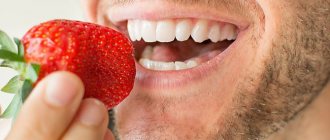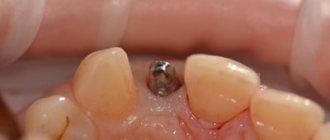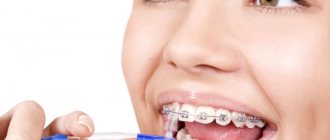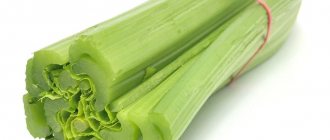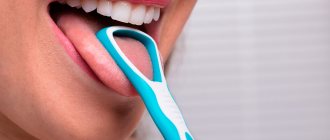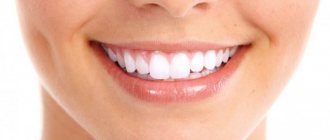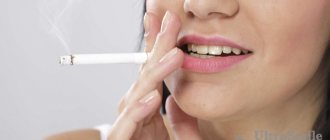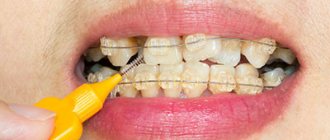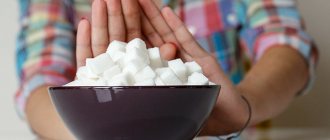Coffee is one of the favorite drinks of many, which, in addition to its wonderful taste and invigorating sensations, also carries not only a positive, but also a negative effect on our teeth, which consists in changing the color of the enamel and acquiring a yellow or dark tint. This happens because the enamel structure is porous, and coffee beans contain coloring substances. They penetrate into the pores and microcracks of the enamel, as a result, the teeth acquire an unattractive appearance. Get more professional information about the effect of coffee on teeth in Saransk We offer at the dental clinic “STOMATOLOGIYA”, which is located at: st. Ulyanova, 93, room 3.
Benefits of coffee for teeth
If coffee consumption is limited to one or two cups per day, it will benefit the teeth by reducing the development of caries. There are statistical data that state that coffee beans in light and medium roast varieties of Arabica and Robusta contain catechin, which blocks the development of streptococci (Streptococcus Mutans), which create conditions during their life for the occurrence of caries. It is worth noting that coffee should be drunk in its pure form, without sugar and milk, which also contains lactose, which leads to the proliferation of microbes and the development of tartar and caries. Another benefit of coffee is to reduce the risk of oral cancer thanks to the phytoncides in its composition.
How do different drinks affect tooth enamel?
Every day we drink a large number of different drinks, but they all have different effects on the enamel of our teeth.
Currently, highly carbonated sweet drinks, bottled fruit teas, energy drinks, and sweet juices are in great demand. Unfortunately, these drinks are especially popular among children and teenagers, but you can’t even imagine the negative impact they have on the health of our teeth. Let's find out!
First of all, SUGAR.
All of the above drinks contain this component. When it comes to teeth, we are not very concerned about the amount of sugar (although there is a lot of it!), the time of contact of sugar with the tooth enamel is much more important. Carbohydrates are the main nutritional substrate for dental plaque microorganisms, and their metabolic products are acids. The result is caries.
Ps: Unfortunately, Coca-Cola Zero is not a healthy alternative. Streptococcus mutans (cariogenic bacteria) will happily feast on the sweetener from this drink
ACIDS
Sweet carbonated drinks usually contain citric, phosphoric or carbon dioxide. These acids aggressively attack the upper layers of enamel, destroying it. Phosphoric acid promotes the leaching of calcium from teeth. The leaching of calcium from enamel hydroxyapatites leads to a decrease in the resistance of teeth to the development of caries.
DYES
The presence of a large number of natural and artificial dyes in the composition can lead to changes in the shade of teeth and staining of restorations. Drinking such popular drinks as coffee, tea, and wine can also lead to darkening of teeth.
Coffee and tea contain a large number of tannins, tannins, which contribute to the accelerated formation of plaque, and strong coloring substances quickly penetrate the hard tissues of the teeth, changing their color.
We will not dwell on the coloring properties of wine (especially red), but it is worth recalling the high acidity of this drink. This has a negative impact on the structure of the enamel and destroys it.
Don't be upset! We in no way encourage you to completely give up your favorite drinks, but we recommend that you reduce their consumption to a minimum, and we also want to give some tips on how to use them.
The main rule is high-quality daily oral HYGIENE!
If you have any questions, our clinic specialists will definitely help you choose the necessary hygiene products and tell you how to use them correctly. In addition, a large amount of useful information can be obtained remotely by completing our marathon.
- Use straws. This way, fewer coloring and aggressive components will get on the tooth enamel.
- Drink more clean water. You can also rinse your mouth with water after drinking harmful drinks - water will wash away sugar and dyes from the surface of your teeth. But actively brushing your teeth after drinking drinks with a high acid content is not recommended.
Finally, I would like to talk about drinks that STRENGTHEN our teeth.
First of all – Water !
Water is the most important component of saliva, and saliva, in turn, protects teeth - it prevents the formation of bacterial plaque, because blocks the proliferation of harmful microorganisms.
Milk. The content of Ca, vitamin D, casein and other useful microelements helps strengthen the hard tissues of teeth and reduces the cariogenic activity of microorganisms.
Herbal teas. Black tea lovers should not be upset, as there is an excellent alternative - herbal teas. Depending on the composition of the tea, it can be a source of microelements beneficial for teeth and prevent inflammatory processes in the mouth.
Harm of coffee to teeth
The harm of coffee largely comes from unreasonable consumption, which affects not only the occurrence of jumps from nervous overexcitation after drinking the drink and subsequent apathy after a while, but also the acquisition of a yellow color of tooth enamel. Drinking hot coffee has a negative impact, especially in cold weather or in combination with cold foods, such as ice cream. Due to temperature changes, the enamel cracks, and pathogenic microorganisms penetrate through the cracks, which lead to the formation of tartar and caries.
How to avoid plaque?
If you are a big fan of this drink, but want to ensure that coffee stains never appear on your teeth, you should adhere to the following recommendations:
- due to the fact that the enamel turns yellow due to the presence of microcracks in it, it is necessary to monitor the condition of the teeth;
- drink the drink through a straw, this solution helps reduce the contact of the enamel with the liquid consumed;
- Low caffeine coffee contains less coloring matter;
- after each coffee procedure, you should rinse your mouth with warm water;
- drink quickly so that the drink does not linger long in the mouth;
- coffee brewed in a Turk will contain more polyphenols than coffee brewed in an espresso machine;
- To prevent your teeth from turning yellow, after each meal you need to brush not only them, but also your tongue, otherwise the bacteria on it will negatively affect the condition of the enamel.
How to get rid of yellow plaque from coffee in Saransk
Yellow plaque and darkening of the enamel from excessive consumption of coffee drink can be easily eliminated by brushing your teeth and, for more serious cases, by whitening. It is recommended to consult a dentist for detailed advice and a solution to this problem, taking into account your specific case.
You can find out more information on teeth cleaning or whitening in Saransk from the clinic administrator by calling: +7 (8342) 308–088, +7 (8342) 777–507 or by filling out the electronic registration form.
Drinking coffee after a dentist appointment
Many people have a hard time with any visit to the dentist and, in order to relieve nervous tension, try to drink coffee immediately afterward. There are a number of restrictions when doing this is not recommended.
Removal of a tooth
After surgery involving tooth extraction, there is always an open wound. In order not to provoke bleeding and other complications, you must refuse any food or drink for 2-3 hours.
A hot drink will dissolve the blood clot; in addition, caffeine dilates peripheral vessels, increases blood pressure, and therefore there is a risk of bleeding.
Implantation
Another surgical operation performed in the oral cavity is the installation of dentures. In this case, tissues are also damaged, and drinking hot drinks will lead to the consequences already described. It is recommended to drink them no earlier than 5 days after implantation.
Teeth whitening
After the whitening procedure for 2 days, you need to be especially careful. You should not take products that have a coloring effect. Over the next 2 weeks, you need to drink a minimum amount of your favorite drink, after which you can return to your usual diet.
Ultrasound teeth cleaning
In this, as in the previous case, after the procedure you must give up coffee for 2 weeks. If this is difficult, then at least drink it in minimal quantities, without sugar and dilute it with milk.
Installation of a seal
The peculiarity of any fresh filling material is that it absorbs any dyes well. To preserve the original color of the filling, it is better to avoid drinking drinks containing caffeine for 2-3 days after its installation.
Medicines and alcohol
Some medications and all alcoholic drinks disrupt the water balance and cause dry mouth. The secretion of saliva decreases, it stops constantly washing the teeth, cleaning them and saturating the enamel with minerals. Dry mouth makes the gums vulnerable to injury and inflammation, which can lead to periodontal disease. Sweet alcoholic drinks are especially harmful: liqueurs, wines. Adding to the dryness when consuming them is the effect of sugar and acids. Red wine additionally stains the enamel.
Clinical researches
Clinical studies have proven that regular use of professional toothpaste ASEPTA COFFEE AND TOBACCO for a month improved the hydration of the mucous membrane by 3.3 times, the remineralizing efficiency increased by 3.9 times, at the same time, the cleansing effect has increasing dynamics and reaches 60 .5% at 4 weeks of use.
Sources:
- Report on determining/confirming the preventive properties of toothpaste “ASEPTA PLUS” COFFEE and TOBACCO Author: doctor-researcher A.A. Leontyev, head Department of Preventive Dentistry, Doctor of Medical Sciences, Professor S.B. Ulitovsky. First St. Petersburg State Medical University named after. acad. I.P. Pavlova, Department of Preventive Dentistry
- Report on determining/confirming the preventive properties of toothpaste “ASEPTA PLUS” GENTLE WHITENING” Author: doctor-researcher A.A. Leontyev, head Department of Preventive Dentistry, Doctor of Medical Sciences, Professor S.B. Ulitovsky First St. Petersburg State Medical University named after. acad. I.P. Pavlova, Department of Preventive Dentistry
- Clinical and laboratory assessment of the influence of domestic therapeutic and prophylactic toothpaste based on plant extracts on the condition of the oral cavity in patients with simple marginal gingivitis. Doctor of Medical Sciences, Professor Elovikova T.M.1, Candidate of Chemical Sciences, Associate Professor Ermishina E.Yu. 2, Doctor of Technical Sciences Associate Professor Belokonova N.A. 2 Department of Therapeutic Dentistry USMU1, Department of General Chemistry USMU2
- Report on the determination/confirmation of the preventive properties of personal oral hygiene products “ASEPTA PLUS” Remineralization doctor-researcher A.A. Leontyev, head Department of Preventive Dentistry, Doctor of Medical Sciences, Professor S.B. Ulitovsky First St. Petersburg State Medical University named after. acad. I.P. Pavlova, Department of Preventive Dentistry
- Clinical studies of antisensitive toothpaste “Asepta Sensitive” (A.A. Leontyev, O.V. Kalinina, S.B. Ulitovsky) A.A. LEONTIEV, dentist O.V. KALININA, dentist S.B. ULITOVSKY, Doctor of Medical Sciences, Prof. Department of Therapeutic Dentistry, St. Petersburg State Medical University named after. acad. I.P. Pavlova
- The role of anti-inflammatory rinse in the treatment of periodontal diseases (L.Yu. Orekhova, A.A. Leontyev, S.B. Ulitovsky) L.Yu. OREKHOVA, Doctor of Medical Sciences, Prof., Head of Department; A.A. LEONTIEV, dentist; S.B. ULITOVSKY, Doctor of Medical Sciences, Prof. Department of Therapeutic Dentistry of St. Petersburg State Medical University named after. acad. I. P. Pavlova
Why doesn't brushing your teeth remove plaque?
Deletes. Just not completely, but about 85%. Over time, micro-scratches still appear on the enamel, where plaque settles, and in addition, there are always hard-to-reach places that are not so easy to clean, and most people are too lazy to do this.
It is important to choose the right toothpaste. Some manufacturers produce stronger products specifically for removing stains from coffee and cigarettes. Soft mass-market options or gentle pastes for sensitive teeth often simply cannot cope with removing yellowness. If you drink 1-2 cups of coffee a day, just try to choose a suitable specialized toothpaste, and you will soon notice that your teeth will become whiter (if they really turned yellow from coffee).
Roasted seeds and nuts
Fresh nuts and seeds can even be healthy, but when heated, most of the valuable substances are destroyed. Instead of vitamins, fatty acids, amino acids, harmful substances are formed. Particles of seeds and nuts can get stuck in the spaces between teeth, under the edge of the gums. If a person often gnaws on seeds, he injures and wears out the enamel on his teeth. Crunching hard nuts cannot be called useful either. If you cannot do without such snacks, it is better to cook them yourself, frying them so that they remain raw inside.
Caffeine
Drinks containing caffeine (any type of coffee, cola, energy drinks) provoke dehydration and slow down the absorption of vitamins and minerals (including calcium). They stain teeth, change the color of enamel, making it darker. Therefore, dentists at the Dentospas clinic do not recommend drinking coffee in large quantities.
Caffeine also has beneficial properties: it contains fluoride and has an antibacterial effect, but coffee drinks do more harm to teeth than good. You can replace coffee with chicory. For those who are used to drinking a lot of green tea, it is better to switch to herbal teas.
You have questions?
We will call you back within 30 seconds
+7
The effect of coffee on your smile
Despite recent speculation about the health risks of coffee, coffee actually has positive effects on your physical and dental health. Coffee is usually bought roasted and then brewed at home or bought in a cafe, which is ideal because roasted coffee has huge benefits for dental health. Medium roast coffee contains the maximum amount of antioxidants, it also has antibacterial properties, and what's more, such coffee prevents the bacteria Streptococcus mutans, which causes tooth decay, from settling on your teeth. This is due to compounds that form in coffee only during roasting, such as melanoidins, polymers that are released into food at high temperatures. People who drink coffee regularly have a reduced risk of tooth decay due to the antibacterial properties of coffee and have whiter teeth than those who drink coffee irregularly. But despite all these advantages, there are, of course, several conditions.
Sweets
The main “enemies” of teeth are chewing candies and caramel. Pieces of toffee or other chewing candies can get stuck in the spaces between teeth, contacting the enamel for a long time, causing accelerated growth of bacteria. Caramel changes the composition of saliva if it is absorbed; it can cause tooth decay, chips, cracks if it is chewed.
Dried fruits are considered harmful sweets. They contain a lot of sugar, stick to teeth, and get stuck in the spaces between teeth.
The exception is dark chocolate, which is considered beneficial for teeth due to the content of polyphenols and flavonoids. They have antibacterial properties and slow down plaque formation.
Effective ways to remove plaque
Simple folk methods will help remove yellowness and weak plaque:
- baking soda. It is gently rubbed into hard dental tissues using a brush or cotton wool. Then the oral cavity is rinsed with plain water;
- Activated carbon . One tablet is ground into powder, which is then applied to the brush. Clean in the usual way, then rinse your mouth;
- hydrogen peroxide. You need to brush your teeth with this product for a couple of weeks. You should be very careful when doing this. This is an effective whitening method, but there is a risk of damaging the enamel.
Activated carbon
Baking soda
Hydrogen peroxide
The following pharmaceutical products will help eliminate the problem at home:
- Electric Toothbrush. The speed of the device is quite high. Therefore, it is possible to carry out a thorough cleaning and eliminate newly formed plaque;
- special strips with a whitening effect . The product is effective, but expensive. The strip is glued onto yellowed fabrics and left for about half an hour. The maximum effect is achieved two weeks after the start of use;
- whitening gels . Considered safe and effective. They are applied to a clean surface and wait until completely dissolved. Such manipulations are performed daily for fourteen days;
- sticks. They have a mild whitening effect. They are typically used to prevent plaque formation and are used immediately after drinking espresso.
Professional cleaning by a dentist is also effective. The procedure is performed in several ways:
- polish using baking soda or lemon powder. This way, soft plaque is eliminated;
- ultrasound. The method allows you to get rid of fossilized, old plaque;
- laser. The method is the most effective, but expensive. In addition, there are a number of contraindications to the use of laser.
